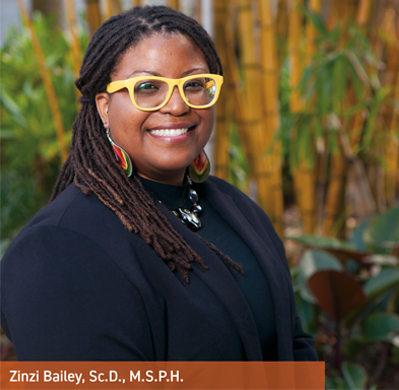
Sylvester researcher Zinzi Bailey, Sc.D., M.S.P.H., continues to make an impact in her work focused on addressing medicine and public health’s role in structural racism and the role of structural racism in driving racial/ethnic health inequities.
After years of authoring papers on the topic published in high-profile journals, including in 2021 the New England Journal of Medicine, Dr. Bailey has become a leading voice in this national conversation. She spent much of ‘21 presenting at such meetings as the Society for Epidemiologic Research, where among other topics, she addressed “Building a movement accountable research process: How can epidemiologists partner with activists to produce actionable research?”
As associate director of Research Leadership and Practice, Dr. Bailey also led the thematic focus on structural racism and health for a new cohort of Interdisciplinary Research Leaders, a leadership program funded by the Robert Wood Johnson Foundation.
As an invited speaker, Dr. Bailey addressed “Structural racism as a root cause of cancer care disparities,” at the National Academies Workshop on Promoting Health Equity in Cancer Care, as well as at Boston University and the American Society for Preventive Oncology Annual meeting; “Racism and racial discrimination and its impact on the life course,” at the Harvard T.H. Chan School of Public Health Alumni Week; and “Operationalizing structural racism for health equity research,” during a National Cancer Institute Webinar.
In disparities-focused research that aims to help create evidence-based policy, Dr. Bailey is principal investigator for a NIH K01 grant-funded study to assess factors in tobacco/e-cigarette use in Florida youth, overall and by county-level sociodemographic characteristics and racial/ethnic segregation.
“Racism is not an isolated ideological event, it’s a system or culture of inequity. So, it’s important that we are able to recognize that in ourselves and our institutions,” said Dr. Bailey. “The more that we are able to recognize our history, the more we can learn from it.”